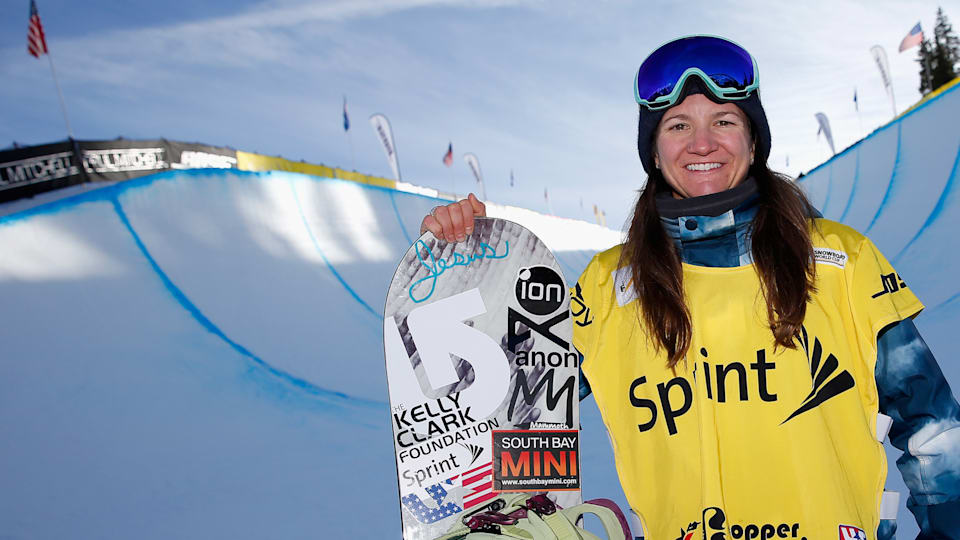
The most successful athlete in snowboarding history, Kelly Clark, has announced her retirement from competition.
The 2002 Olympic halfpipe champion released a video looking back on her career and thanking her friends, including fellow gold medallists Chloe Kim, Hannah Teter and Torah Bright for making her "a better snowboarder than I ever imagined".
The 35-year-old bows out this weekend at the Winter X Games in Aspen, Colorado.
Clark made her competitive debut in 1999 and went on to score 78 wins from 137 podium finishes in just under 200 events.
She claimed three Olympic medals, following up her gold in Salt Lake City with bronze at Vancouver 2010 and Sochi 2014.
In her 20-year career she has won seven Winter X Games titles and a record eight US Opens.
Pushing the boundaries
Clark was born in Newport, Rhode Island in July 1983 but grew up in West Dover, Vermont and started snowboarding at the age of seven.
She made the USA national 'B' team in 1998/99 and stepped on the podium in her first event, earning her instant promotion to the 'A' team.
But 2002 was her breakout year.
Clark had deferred her entry to the University of Rhode Island and knew that anything less than a successful season would see her take that college place.
Despite tearing a knee meniscus in December 2001, the 18-year-old bounced back to become a snowboard star.
In January 2002, she secured her first Winter X Games title.
And a month later, she produced a superb second run to pip France's Doriane Vidal for Olympic gold in Salt Lake City.
"Does this mean I don't have to go to college?" - Kelly Clark's first words to her father after winning Olympic gold
For the next 14 years, Clark performed at the very top of her sport.
She was also a pioneer of women's snowboarding.
in 2011, before her fourth X Games triumph, she became the first woman to land a 1080 spin.
Clark continued to excel and took three consecutive FIS World Cup titles from 2013 to 2015.
But at the Winter X Games in Norway in February 2016, she crashed heavily suffering a detached hamstring and a serious hip injury.
She told Burton, "I was already dealing with my hip, and everything else was really vulnerable. So I tore my hamstring off the bone as an additional result of the crash."
Incredibly, Clark managed to continue competing for another month.
But in order to avoid a hip replacement 10 years later, she underwent surgery which required close to a year of rehabilitation.
That did not dent Clark's desire to appear at a fifth Olympic Games, and she won the PyeongChang test event in February 2017.
Then in January 2018, Clark took the US Grand Prix to book her place in Korea.
Her superb comeback did not result in a fourth Olympic medal.
At PyeongChang, she finished fourth for the second time at a Games.
Clark's legacy
While leading the way on the halfpipe, she became a mentor to younger boarders including a certain Chloe Kim.
They first met at Mammoth Mountain in California when Kim was just eight years old.
Clark recalled, "She tugged on my sleeve and asked to go up the lift with me. It was pretty cute."
Kim eventually took over from Clark as the world's premier snowboarder, but still looks up to her hero.
After winning gold at PyeongChang, Kim gave her team-mate the Order of Ikkos medal.
Since Beijing 2008, Team USA Olympic medallists have awarded the Order of Ikkos (named after the first recorded Olympic coach in Ancient Greece) to a person, usually a coach, who inspired them to their success.
It was just the second time the honour had gone to a fellow athlete.
And in Clark's video marking her retirement, Kim expressed her gratitude to her friend and rival.
"Thank you for being that person that all the girls can look up to." - Chloe Kim
In 2010, Clark started up her Kelly Clark Foundation to help children get into snowboarding.
One of the beneficiaries of that programme, Maddie Mastro, competed alongside Clark and Kim at PyeongChang.
Speaking ahead of PyeongChang, Clark said, "I think it’s so important to give back. Snow sports can be expensive and so we look to break down some of those financial barriers and we fund high-level athletes."
The next phase
Mastro and Kim's combined age at PyeongChang of 34 was equal to that of Clark's.
And now the master has decided to pass on the torch.
"I feel that at last I've found my own personal ceiling, and it's time to let others stand on it.
"Just like I stood on the ceiling of the generation before me, the next generation will take halfpipe snowboarding further than I ever could."
After retirement Clark will continue to work with her long-time sponsors on snowboard design.
Her current co-creation, the limited edition Rise, is billed as one of the most sustainable boards ever.
But quitting competition does not mean Clark will be abandoning the slopes at any time soon.
She said, "I've always been a snowboarder and I have no intention of stopping.
"Less time in a jersey just means more time to explore what else snowboarding has to offer."
